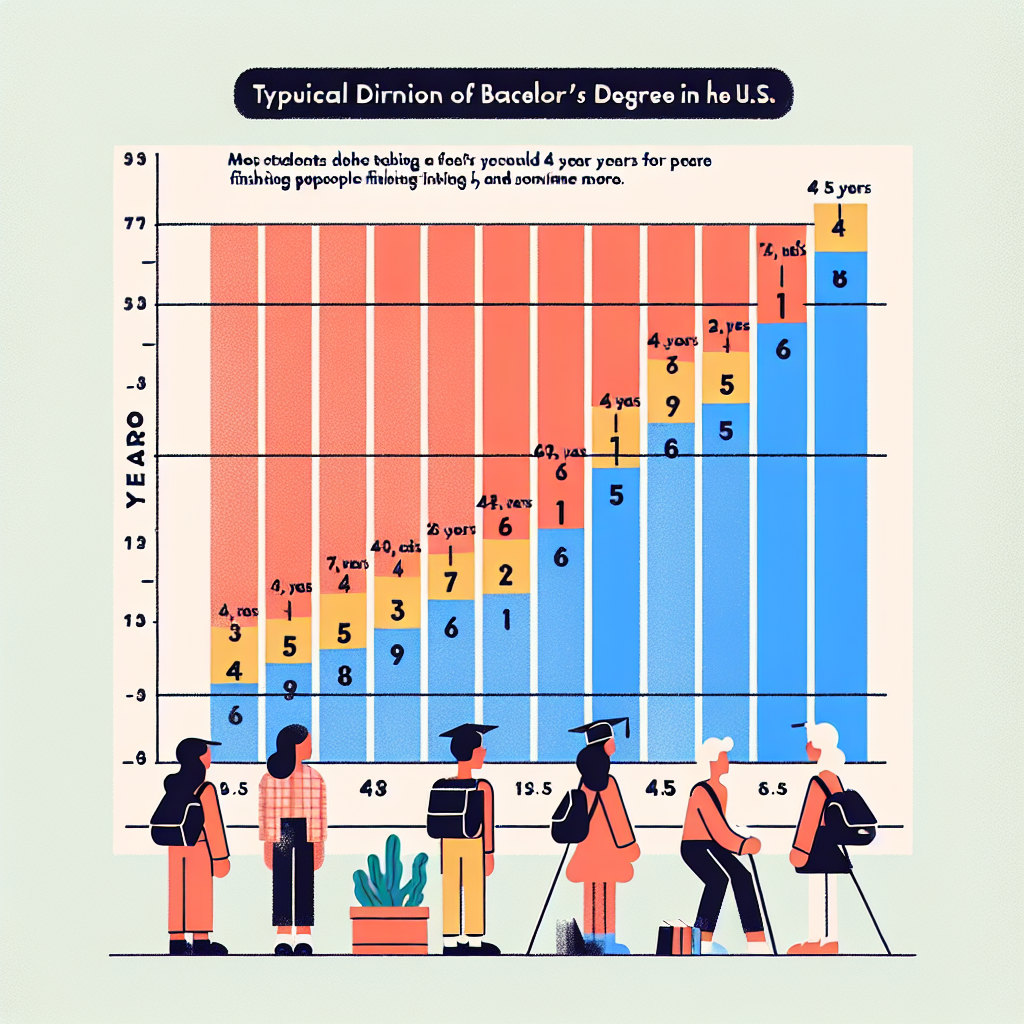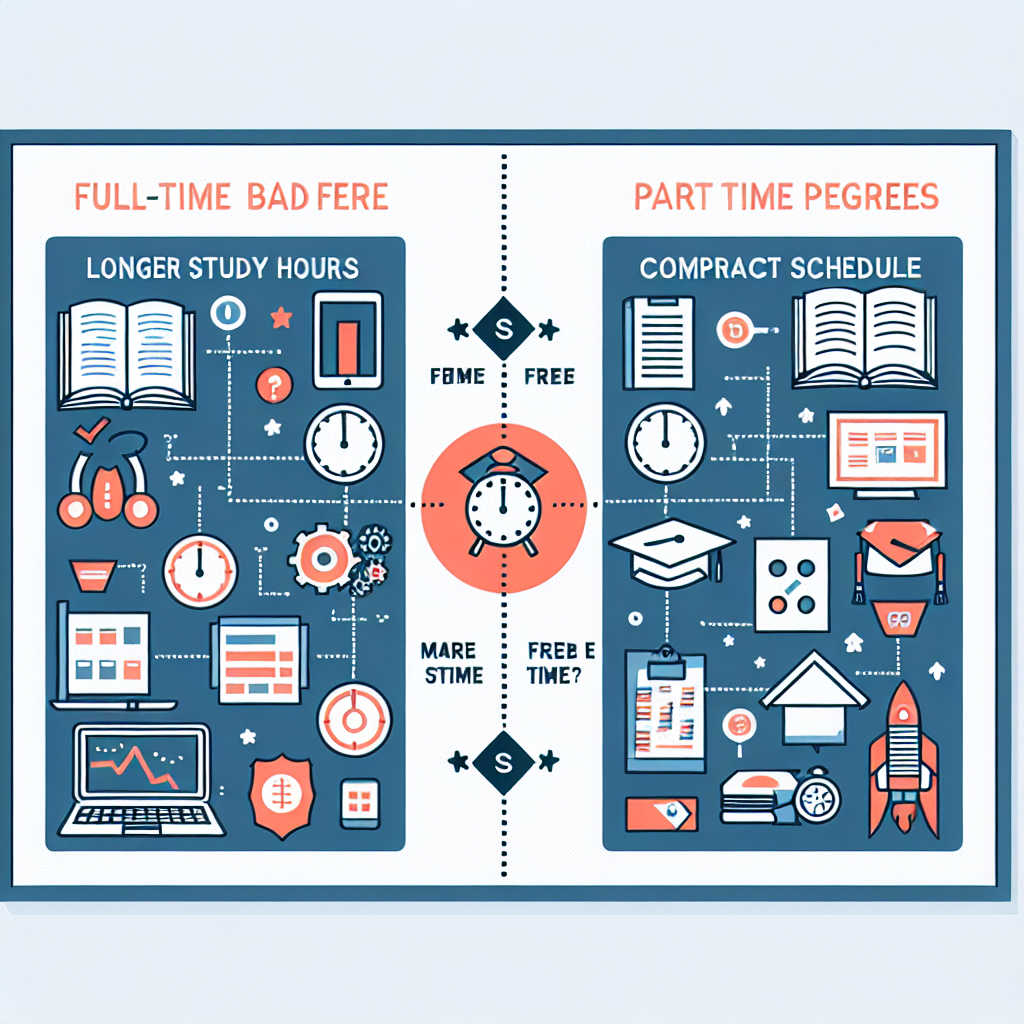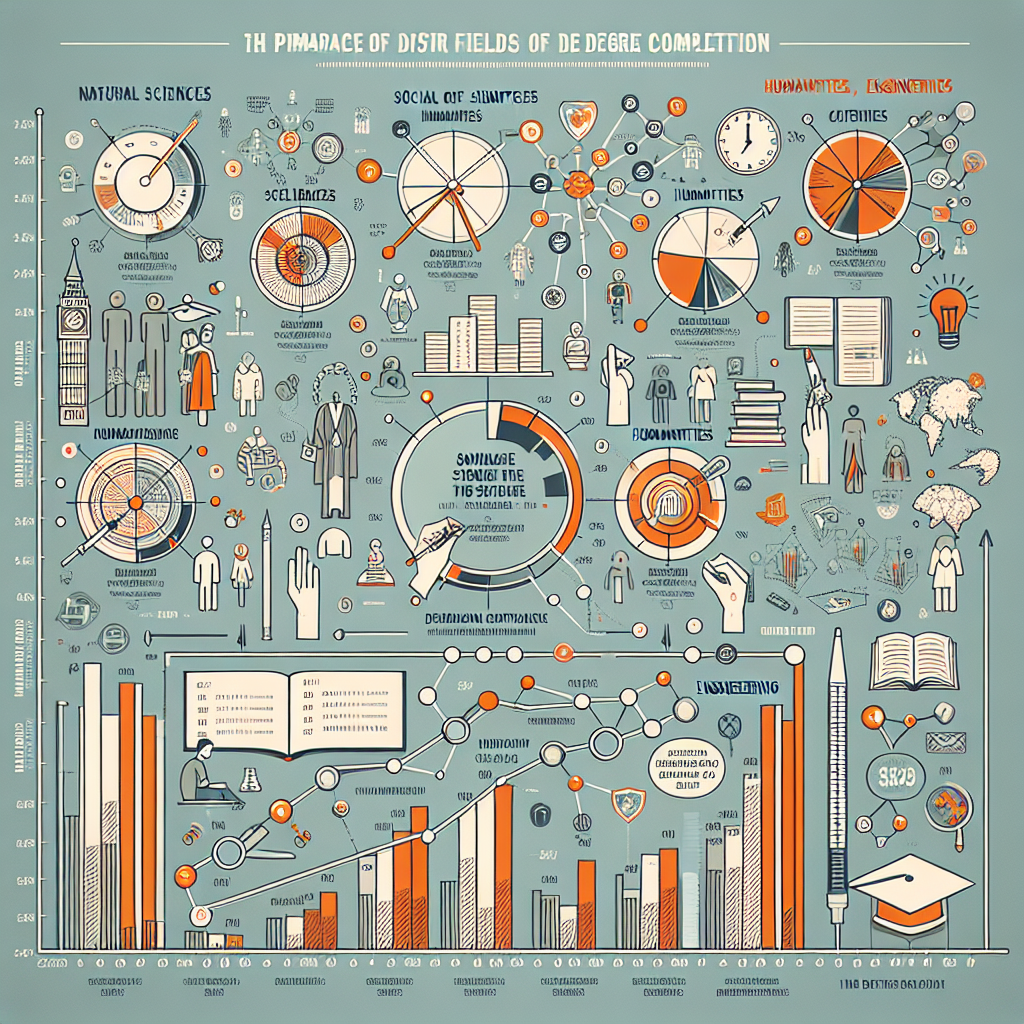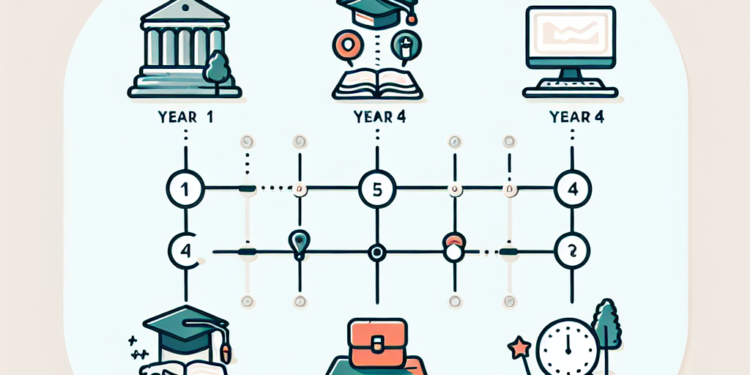How Long is Bachelor Degree. A bachelor’s degree is a significant milestone in one’s educational journey. It’s a stepping stone to a promising career and a brighter future.
But how long does it take to earn this degree?
The answer isn’t as straightforward as you might think. The duration of a bachelor’s degree can vary greatly. It depends on several factors, including the country, the field of study, and the type of institution.
In the United States, a bachelor’s degree typically takes four years to complete. However, this is not a universal standard. In some countries, like the UK, it may take only three years.
The field of study also plays a crucial role. Some programs, like architecture or engineering, may take longer. On the other hand, accelerated programs can allow students to finish in less than four years.
Part-time students may take longer to complete their degree. Often, it can take 5-6 years or more. Online bachelor’s degree programs offer flexibility and may affect the time to completion.
The structure of the academic year can also influence the duration of the degree. Full-time students usually take 12-15 credit hours per semester. A typical bachelor’s degree requires 120-130 credit hours.
Financial considerations can impact the time to degree completion. Tuition costs and availability of financial aid can extend or shorten the duration.
The average time to degree completion has been increasing in recent years. This trend is due to various factors, including working while studying and personal circumstances.
This article aims to provide a comprehensive understanding of the duration of bachelor’s degrees. It will delve into the factors that influence this duration and provide insights to help you plan your educational path.
Whether you’re a high school student, a college aspirant, a parent, or an education counselor, this article will equip you with the knowledge you need. Let’s embark on this journey to understand the duration of bachelor’s degrees.
What is a Bachelor’s Degree?
A bachelor’s degree is an undergraduate academic program. It usually spans a few years of study, awarding students foundational knowledge in a subject area.
This degree is generally the first step in higher education. It paves the way for advanced studies, like master’s or doctorate programs.
Bachelor’s degree programs offer a broad education. They combine major-specific courses with general education requirements, fostering well-rounded graduates.
Such degrees are offered in numerous fields. Students can choose from areas like humanities, sciences, business, and engineering, each shaping future career paths uniquely.
Typical Duration of Bachelor’s Degrees in the U.S.

In the United States, a bachelor’s degree typically takes about four years to complete. This is the standard duration for full-time students.
The degree usually requires completing around 120 to 130 credit hours. Students typically earn these credits over eight semesters.
Most U.S. universities operate on a semester system. This means students take classes in two main terms per year: fall and spring.
However, the time to complete the degree can vary How Long is Bachelor Degree. Here are some factors influencing completion time:
- Major or field of study
- Course availability
- Transfer credits
Many students also choose to take summer courses. Doing so can potentially reduce the total time to earn their degree.
International Variations in Bachelor’s Degree Time
Bachelor’s degree durations vary significantly across the globe. Different countries adopt unique educational frameworks, which affect the time needed to graduate.
In the United Kingdom, a typical bachelor’s degree can often be completed in three years. This is one year less than the U.S. standard duration.
Australia also offers three-year bachelor’s degrees. However, some specialized programs might require an additional honors year.
In Germany, bachelor’s degrees often last three years as well. Yet, some programs could extend to four years, particularly in more intensive fields.
Here’s a quick look at typical durations in different countries:
- United Kingdom: 3 years
- Australia: 3 years (plus possible honors year)
- Germany: 3-4 years
Variations also occur based on cultural and educational norms. Scandinavian countries often emphasize practical training, which can extend study time.
In Japan, a bachelor’s degree typically takes four years to finish. Their system is similar to the U.S. in terms of structure but includes unique general education courses.
Many countries now offer global and exchange programs How Long is Bachelor Degree. These can influence the time students spend earning their degrees abroad.
Full-Time vs. Part-Time Bachelor’s Degree Programs

Choosing between full-time and part-time study affects how long it takes to earn a bachelor’s degree. Each option offers distinct advantages and potential drawbacks.
Full-time students typically complete their degrees in a shorter time frame. In the U.S., this generally means four years, contingent upon taking a full course load each semester.
A full-time course load usually requires 12-15 credit hours per semester. This intense schedule can expedite graduation but demands significant time management.
Part-time students often take fewer credits each semester. This slower pace allows for balancing work, family, or other obligations.
However, part-time study often extends the bachelor’s degree time to five or six years. The duration depends on the number of courses taken each term.
Flexibility is a key benefit of part-time programs. Students can adjust their schedules based on personal and professional commitments.
Financial considerations play a significant role in this decision. Part-time study may ease immediate financial pressure but could increase the total time to graduation.
On the other hand, financial aid availability often requires full-time enrollment. This can influence students’ choices and impact their study pace.
Ultimately, the decision between full-time and part-time study should align with personal goals and circumstances. Each path offers a unique educational experience.
Both full-time and part-time students must consider their long-term academic and career aspirations. Strategic planning can ensure timely and successful degree completion, regardless of the chosen path.
Accelerated Bachelor’s Degree Programs
Accelerated bachelor’s degree programs offer a faster route to graduation. They cater to students who wish to enter the workforce swiftly.
These programs often compress coursework into a shorter timeframe than traditional four-year degrees. This intensity can reduce the bachelor’s degree time significantly, sometimes by a year or more.
Students might complete an accelerated program in 3 years or even less. This is possible through condensed semesters or year-round coursework, including summer terms.
These programs require a high level of commitment and focus. The rigorous pace means students must handle increased workloads and stay organized.
Motivated learners benefit from the early entry into their professional careers. This fast track can also result in reduced educational costs over time.
Despite their benefits, accelerated programs may not suit everyone. Some students find the pressure and pace challenging to manage alongside personal obligations.
Not all fields of study offer accelerated options, but they are common in areas like business and certain liberal arts disciplines. Students should explore the availability in their specific field.
These programs demand advanced planning and clear academic goals. Prospective students must ensure their readiness to undertake such an intensive schedule.
Accelerated degrees open opportunities for gaining a competitive edge in the job market. They present an efficient path for those ready to fully commit to their studies How Long is Bachelor Degree.
For some, this route can be a perfect fit, balancing the need for speed with the educational rigor required to succeed professionally.
The Impact of Field of Study on Degree Duration

The duration of a bachelor’s degree can vary significantly based on the chosen field of study. While most degrees aim for completion in about four years, some disciplines naturally extend beyond this timeframe.
For instance, STEM fields such as engineering and architecture often require a longer commitment. These programs typically involve a comprehensive curriculum with lab work, projects, and more credit hours, which can lengthen the time required for graduation.
Certain fields demand extensive practical experience and mastery over complex concepts. This in-depth approach is crucial for preparing students for professional challenges in their respective industries.
Programs in disciplines like nursing, education, and social work may also take longer due to mandatory field placements or teaching practicums. These hands-on experiences are integral to gaining real-world skills and competencies.
Some areas of study require additional certifications or internships that extend the education timeline. This necessity often aligns with industry standards for professional practice and licensure.
It’s important to recognize that degree requirements vary not only by field but also by institution How Long is Bachelor Degree. Universities may impose different credit and course mandates that influence how long it takes to earn a degree.
Here’s a quick summary of fields that might require extended durations:
- Engineering: Intensive coursework and project labs can extend beyond four years.
- Architecture: A complex mix of design studio work and theory lengthens the study period.
- Nursing: Clinical training hours and specialized courses often add time.
- Education: Student teaching and certification processes may exceed the standard timeline.
- Social Work: Fieldwork and practice courses can prolong the academic journey.
Prospective students should assess these factors to understand the potential duration of their desired program. This knowledge helps in planning and adjusting expectations regarding their educational journey and professional readiness.
Double Majors and Dual Degrees: Extending the Timeline
Pursuing a double major or dual degree can significantly extend your time in college How Long is Bachelor Degree. However, the additional credentials can offer substantial career benefits and opportunities.
Choosing to complete two majors involves meeting all the requirements for each field. This approach usually means taking more courses, which may require an extra year or two beyond the usual graduation timeline.
Dual degree programs involve completing two distinct degrees, often across different disciplines. The workload and credit requirements are typically higher, necessitating more time compared to a single bachelor’s degree.
While these extended programs demand more commitment, they can also provide a competitive edge. Employers often value the diverse skill set and knowledge base that comes with completing multiple programs.
Students should carefully weigh the benefits against the potential delay in entering the workforce. Thorough academic planning and advising can help manage the increased demands and pace the path to completion effectively. Ultimately, understanding how double majors and dual degrees impact the graduation timeline is key to making informed decisions about pursuing them.
Online Bachelor’s Degree Time Considerations
Online bachelor’s degree programs offer flexibility, which can influence time to completion. These programs are ideal for students with busy schedules or those who cannot commit to traditional full-time study.
One key advantage of online education is the ability to attend classes at your own pace. This flexibility allows students to speed up or slow down their learning depending on personal circumstances. However, balancing work, family, and education can stretch out the time needed to graduate.
Many online programs offer asynchronous courses, enabling students to learn when it suits them best. This approach can be especially beneficial for those balancing multiple commitments. Still, students must self-motivate and manage time effectively to avoid prolonging their studies.
Some universities provide accelerated online bachelor’s degrees, designed for quicker completion. These programs often compress courses into shorter, intensive terms allowing students to finish faster than in traditional settings.
Despite the flexibility, online students face unique challenges, such as limited face-to-face interaction and the potential for feeling isolated. Engaging actively in virtual discussions and seeking help when needed can mitigate these issues. The self-directed nature of online learning demands discipline to maintain progress and avoid extending time to graduation.
The Role of Internships, Co-ops, and Study Abroad
Internships, co-op programs, and study abroad opportunities can greatly enrich a student’s education. These experiences offer hands-on learning that complements academic coursework. However, they can also extend the time needed to complete a bachelor’s degree.
Participating in internships allows students to gain practical experience in their field. These opportunities often occur during semesters or summer breaks, which can delay graduation if the schedule is not carefully managed. Despite this, the professional skills gained can be invaluable.
Co-op programs typically integrate work placements with academic study. While they may extend the timeline for earning a degree, they provide extensive industry exposure. This experience can lead to better job prospects upon graduation, making the extra time worthwhile.
Study abroad programs immerse students in different cultures and educational systems. While these programs usually last a semester or an academic year, students may face credit transfer issues. Planning ahead and consulting academic advisors can help ensure that international study enriches the degree rather than prolonging it.
Credit Hours and Course Load Explained

Understanding credit hours and course load is crucial for managing the timeline of a bachelor’s degree. Credit hours measure the amount of classroom and academic work needed for a course. Each course often accounts for a set number of credit hours based on its duration and the work required.
Typically, a bachelor’s degree requires completing 120-130 credit hours. This figure varies by institution and program. Full-time students usually enroll in 12-15 credit hours per semester. This pace generally aligns with graduating in four years.
The course load each semester can significantly impact your path to graduation. Balancing a heavier course load can allow students to complete their degree more quickly. However, this approach requires careful planning to avoid burnout or academic stress.
Key Points on Credit Hours:
- Average Credit Requirement: 120-130 total credits
- Full-Time Study Load: 12-15 credits per semester
- Impact on Graduation Time: Direct correlation between course load and time to graduate
Flexible course schedules, including summer terms, allow students to adjust their pace. They can take fewer credits during regular semesters or catch up if behind. This flexibility helps accommodate personal circumstances without extending the duration unduly.
Understanding the interplay of credit hours, course load, and overall study plan is essential for on-time graduation. Planning with academic advisors ensures that prerequisites and required courses fit smoothly into your schedule. This careful coordination helps maintain an efficient trajectory towards your academic goals.
Summer Courses and Their Effect on Graduation Time
Summer courses offer a valuable opportunity to expedite your degree completion. By enrolling in these classes, students can earn additional credits outside the traditional academic calendar. This can be particularly beneficial for those needing to catch up or stay on track.
Participating in summer sessions provides flexibility in planning your educational path. It allows students to manage challenging courses separately or take prerequisites and free up their regular semesters for other essential classes. This strategy can significantly lighten course loads during the standard academic year, reducing stress and enhancing the learning experience.
Taking summer courses can potentially lead to early graduation. By accumulating extra credits during summer, students may finish their degree requirements ahead of schedule. This could offer an early start in the workforce or for graduate studies. Leveraging summer sessions is an effective method to optimize time without compromising academic goals How Long is Bachelor Degree.
Financial Considerations and Their Impact on Degree Duration
Finances play a crucial role in shaping the timeline for completing a bachelor’s degree. Tuition costs, student loans, and financial aid availability can dictate how long a student remains enrolled. Many students face the challenge of balancing education costs and income, influencing their course load choices.
For those who must work while studying, taking fewer courses per semester is a common scenario How Long is Bachelor Degree. This approach can extend the time needed to earn a degree. Part-time employment, although essential for managing expenses, may result in a reduced academic workload, postponing graduation.
On the other hand, scholarships and grants can alleviate financial pressure. Securing these funds can allow students to focus more on their studies and enroll full-time. As a result, they may achieve a more traditional four-year degree timeline without the distraction of work obligations.
Student loans offer another financial avenue but come with their own considerations. Some students might choose to maximize their course loads to minimize total borrowing and debt. Conversely, the fear of accumulating high debt could lead others to prolong their education while funding their studies incrementally.
Finally, financial literacy is vital for students mapping out their educational timelines. Understanding the financial implications of their choices can aid in strategic planning. Awareness of tuition structures, aid options, and long-term repayment plans can empower students to manage their journey effectively.
Transfer Students and Community College Credits

Transfer students bring unique dynamics to the timeline for completing a bachelor’s degree. These students often begin their education at community colleges, acquiring general education credits before transitioning to four-year institutions. This path can provide a cost-effective way to pursue higher education.
One key advantage for transfer students is the potential to enter a bachelor’s program with advanced standing. By transferring credits, students can often bypass introductory courses. This can hasten their progress towards degree completion, assuming transfer agreements between institutions are honored.
However, not all credits transfer seamlessly. Some students face challenges when certain courses do not align with their new institution’s requirements How Long is Bachelor Degree. This misalignment can necessitate additional coursework, extending the time to graduation. Careful planning and consultation with academic advisors are crucial to navigating these complexities.
Articulation agreements between community colleges and universities can provide clear pathways for credit transfer. These agreements are instrumental in ensuring a smoother transition and minimizing time lost. By understanding these agreements, transfer students can effectively plan their academic path and potentially shorten their degree duration.
The Increasing Average Time to Degree Completion
How Long is Bachelor Degree. The average time to complete a bachelor’s degree has been creeping up in recent years. While the traditional four-year timeline still exists, various factors now influence this duration.
One contributing factor is the rise in students attending part-time. Part-time enrollment often stems from the need to balance work, family, and studies. Such commitments understandably extend the overall time needed to finish a degree.
Another factor is changing majors, a common occurrence among students exploring different career paths. Adjusting a major can require additional courses and, subsequently, more time to fulfill graduation requirements. This flexibility, while valuable, can lengthen the education journey.
Financial pressure is also playing a role in extended degree timelines. With tuition costs rising, students may work more hours to fund their education. This balance between work and study often results in taking fewer courses per semester, thereby prolonging the time until graduation.
The Importance of Academic Advising and Planning
Effective academic advising can significantly impact the duration of a bachelor’s degree. Advisers help students navigate the complex requirements of their chosen programs. With the right guidance, students can avoid unnecessary courses, saving both time and money.
Planning a degree path with an adviser ensures that students meet all prerequisites. By doing so, they can prevent delays in enrolling for advanced courses. This foresight is crucial for staying on track toward timely graduation.
Advisers also provide insights into balancing course loads. Understanding how to manage credit hours each semester can prevent burnout. It also helps students maintain a steady academic pace, reducing the risk of extending their degree.
Furthermore, advising fosters awareness of available resources, such as tutoring and career services. Students who utilize these services may overcome hurdles more efficiently. Overall, proper planning and advising empower students to make informed decisions about their educational journey.
How Long is Bachelor Degree
Planning your education path requires careful consideration of various factors. Understanding the typical duration of bachelor’s degrees is crucial in setting realistic expectations. It’s essential to weigh different program options, as each may offer unique benefits.
Taking an active role in your academic planning can lead to a more fulfilling educational experience How Long is Bachelor Degree. Engaging with advisers, exploring accelerated programs, and considering financial implications are all part of this process. These steps can help you stay on track and complete your degree in a timely manner.
Ultimately, the goal is to align your educational pursuits with your personal and career objectives. By doing so, you ensure that your time in college is meaningful and productive. With thoughtful planning, you can navigate your educational journey effectively, setting the foundation for future success How Long is Bachelor Degree.




